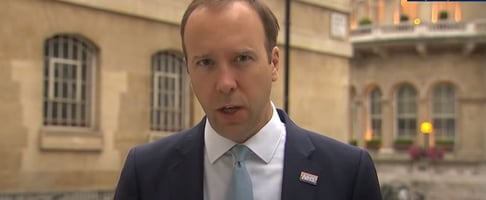It is always great when you lovely readers and our social media followers let us know about...
When we look in this media training blog at the mistakes that are made in media interviews, we often focus on the performance of individual spokespeople.
It might be poor preparation, insufficient media training, an angry reaction to difficult questions, perhaps trying to dodge uncomfortable questions or a failure to support messages with examples.
But what if the same organisation’s spokespeople keep having trouble with the same type of question?
Huawei has found itself firmly in the spotlight recently and its spokespeople have strived to stress its independence from the control of the Chinese government.
The problem is that every time it is asked to offer an opinion on that government’s actions or policies, the people responding to those questions squirm, evade and ultimately fail to provide any semblance of a meaningful answer.
We first saw this when Jeremy Thompson, vice president of Huawei UK, appeared before the Science and Technology Select Committee earlier this month.
Greg Clark, the chairman of the committee, set a skilful trap.
“Mr Thompson, you said that in the UK Huawei operates as other companies do”, he said. “You cited your experience of BT. Are employees and directors of Huawei in the UK free to express their views?'
Mr Thompson replied: “Yes. Very much so. We have a management team in the UK like any other UK organisation and we are free to express our views, yes.”
With the trap set, Mr Clark then asked: “So what is your view of the new security law in Hong Kong?”
Mr Thompson nervously laughed and then said: “Ok. I am a telecoms executive. I have worked in telecoms all my life. My role is to enable our customers who are the carriers to provide communications faster and cheaper. I don't have a view.”
And the exchange didn’t end there.
“You don't have a view?”, Mr Clark asked. “As a person you are free to, as you just said, to express your views as any citizen in the UK would, but you don't have any view on something that is quite germane to your commercial international prospects I would have thought. You have no view?”
Mr Thompson replied: 'You have invited me here, Mr chairman, as a representative of Huawei. I represent Huawei. Huawei does not get involved in judging the rules of different countries.”
Mr Thompson had, in short, got himself into a muddle where the message no longer worked, he sounded defensive and the insistence that it was independent seemed to lack substance.
Were any lessons learnt from that?
Well, not if an interview its UK communications director gave to Newsnight last week is anything to go by.
Ed Brewster appeared on the programme on the day it was announced the country's telecoms networks would not be allowed to buy new Huawei 5G kit from 31 December and all such equipment should be stripped out of mobile networks by 2027.
Presenter Emily Maitlis asked Mr Brewster to give her ‘a sense of how removed it was allowed to be from the actions of the Chinese government’ by trying to get his view on whether China should have implemented the new security law against protests in Hong Kong.
And it resulted in a lengthy and uncomfortable exchange:
Brewster: “So, look, I’m here representing Huawei today. My Job and our job is to provide telecommunication networks with equipment. We don’t own or operate the telecoms networks, we provide the equipment…”
Maitlis (interrupting): “It is a simple enough question. You can show me how removed you are allowed to be as the director of comms from the thinking of the Chinese state. So, would you say ‘it is a terrible idea to bring in this law’ or would you say ‘I back that law because I work for Huawei’?”
Brewster: “No, so look, no-one is interested in my personal opinion frankly. I’m here to represent the business.”
Maitlis: “That’s not your opinion presumably. It is whether you are able as a director of communications of Huawei to tell us what the position is of the company. I could ask John Lewis what the position is on Scottish independence, or Brexit, or trade deals, or any number of things. I’m just asking you, for example, should China let independent observers into the Uighur camps to understand what is happening to those people. You’ve heard many MPs in this country say that is a huge travesty of human rights. You could demonstrate the independence of Huawei by saying ‘absolutely’.
Brewster: “So, look, we’ve just seen a report about the Yemen and you could be asking me about the British government’s policy in Yemen.”
Maitlis: “I would ask the British government about that.”
Brewster: “I’m not the Chinese government or the UK government – I’m a private technology company.”
Maitlis: “So, you can presumably tell us what you think, whether it is about the Uighurs, Hong Kong laws, whether it is about the actions of the Chinese government in Tiananmen Square in 1989 – would you condemn that?”
Brewster: “So, look, my job today is to make sure as a private communication company, we are here to ensure we deliver high-quality communication to our operators. We are disappointed with the decision today and are urging the government to reconsider that decision.”
Again, it was all a bit of a mess. It made Mr Brewster sound evasive and argumentative, got him into some dangerous territory where he was effectively criticising the question – ‘no-one is interested in my personal opinion’ - and left viewers with the impression the ‘independence’ message was hollow.
Huawei’s spokespeople have been put in a situation where the company wants to show that it is independent but where they don’t want to say anything to upset the Chinese government.
That’s not an easy puzzle to solve.
What was clear from the select committee hearing and the subsequent media coverage it generated was that the policy of insisting it was independent and then refusing to offer opinions was not working.
And that was not a line of questioning that was likely to go away, so it needed to come up with a different approach for future interviews.
A key part of media preparation, particularly when you are doing a number of interviews or public appearances over a short time period, is to look at what has gone well, what could be improved and adapt messages and responses to likely difficult questions accordingly.
Without really knowing how independent Huawei is, it is tricky for us to suggest better answers.
But for me, its spokespeople would be better saying something like: “You could ask me about China, about Brexit, or about something Donald Trump has said, but Huawei does not comment on political or wider issues anywhere in the world.
“I know some companies are comfortable doing that and that many are reluctant. We like to stick to what we know best – telecommunication networks.
“And what I can tell you is that we believe today’s decision is a bad one for anyone who has a smartphone.”
A response like that broadens the question away from it being about the actions of China, states that it doesn’t get drawn on discussing political issues anywhere in the world and then tries to steer the conversation on to what it wants to talk about.
Another option would be to say something like: “Of course I have a personal view.
“But I’m not here to discuss my opinions on Chinese politics. It’s a bit like Brexit – I have seen discussions on that at dinner parties and it becomes an argument that dominates the whole evening.
“And I think it is really important that we don’t lose focus today on this decision which is bad news for anyone with a mobile.”
This option avoids the flimsy “I don’t have a view” line, and offers a comparison and then moves the conversation forward.
By not adapting the approach to these questions, Huawei left its spokespeople exposed, insisting on a position they seem unable or unwilling to support and it has become a distraction.
.@maitlis on fire with UK Director of Communications Huawei. He's saying he's not bound or connected to Chinese Govt policies but refuses to answer any questions re Chinese Govt policies...#Newsnight
— Dorina (@Dorina335) July 14, 2020
Blimey! Another brilliant performance from Emily Maitlis skewering #Huawei's coms Director on his independence from the Chinese government. He's squirming to avoid answering a simple question on his position on Chinese government policy and human rights abuses #Newsnight
— Ian Middleton (@IanMiddletonX) July 14, 2020
Which is a shame, because there were parts of the Newsnight interview I liked, particularly the strong start where Mr Brewster took the opportunity to immediately get his message across.
Asked who was to blame for the decision the UK government took, he replied: “Well, it is a very disappointing decision from our side. We think it is bad news for the UK. We think it is bad news for anyone who has a smartphone. Bad news for anyone who uses the internet.”
He also dealt pretty well with an uncomfortable personal question, when Ms Maitlis asked him “what is your job now, if you are the UK comms director and the UK has shut the door – do you still work for Huawei?”
He replied: “Of course I still work for Huawei. We are disappointed with the decision, but the Government said today Huawei equipment will be here and will be operating here.”
Mr Brewster does have a tendency to start every answer with “so, look”, and we have spoken before in our media training blogs about how annoying and distracting these filler words can be.
But what will be remembered from this interview and other recent appearances is Huawei’s continuing inability to deal with a question that keeps tripping it up.
Media First are media and communications training specialists with more than 35 years of experience. We have a team of trainers, each with decades of experience working as journalists, presenters, communications coaches and media trainers.
Subscribe here to be among the first to receive our blogs.




